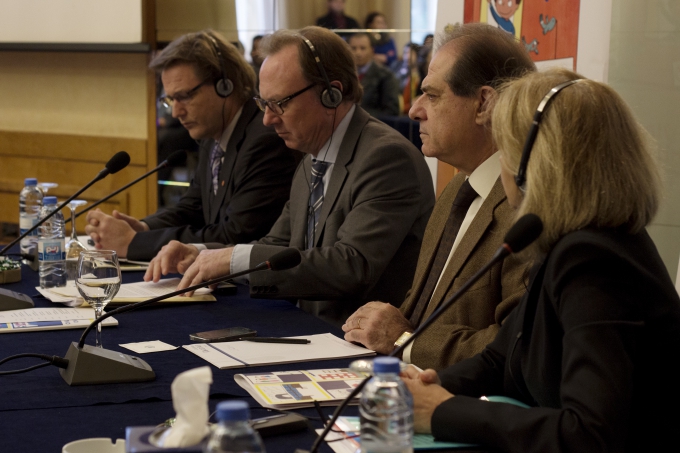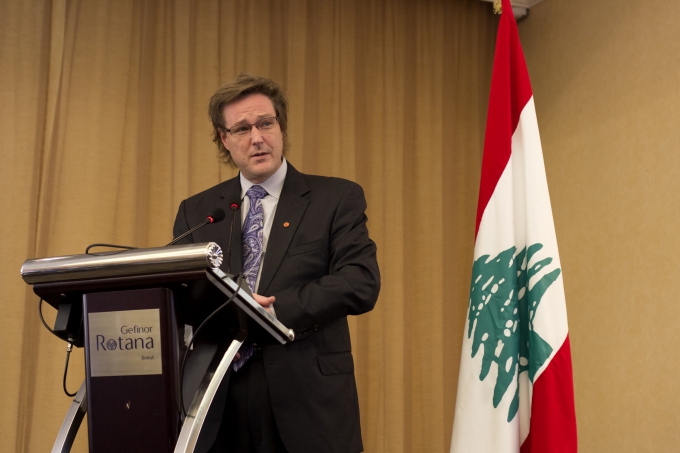Ministry of Labour, Save The Children, ILO, UNICEF, launch study on plight of working children on streets in Lebanon
BEIRUT, 16th February 2015 – A study launched today sheds light on the plight of working street-based children in Lebanon. The report, “Children Living and Working on the Streets in Lebanon: Profile and Magnitude”, is the first of its kind in Lebanon to assess the scope and characteristics of the increasingly visible phenomenon of one of the worst forms of child labour.At the request of the Ministry of Labour in Lebanon, the study was commissioned by the International Labour Organization (ILO), the United Nations Children’s Fund (UNICEF) and Save the Children International (SCI) to understand the reasons behind children living and/ or working on the streets. Their work includes begging, street-based trade and services, and forms of illicit activities among others.

From left to right: Mr. Ian Rodgers (Save the Children International Country Director), Mr. Frank Hagemann (ILO Deputy Regional Director), H.E Mr. Sejaan Azzi (Minister of Labour), Ms. Annamaria Laurina (UNICEF representative in Lebanon)
"With the ILO's support to the Ministry of Labour and other government and non-governmental institutions, children working on the streets were identified as a priority intervention area,” said Deputy Regional Director of the ILO Regional Office for Arab States Frank Hagemann. “Although almost three-quarters of these children originate from Syria, children living and/ or working on the streets are a long-standing challenge in Lebanon. The findings of this new study will allow the ILO to work more effectively with its partners to take children off the streets and offer them a better future.”
While the recent influx of refugees from Syria has resulted in an increase in street-based children, the study reveals that it is not the core cause of the phenomenon.
The research identifies four main driving factors that cause children to live or work on the streets of Lebanon: social exclusion, vulnerability of households, the influx of Syrian refugees into Lebanon, and organized crime and exploitation of children.
(Click image for full report)
“Children on the street s are extremely vulnerable to all forms of exploitation and abuse in their daily lives, as well as occupational hazards,” said UNICEF Lebanon’s Representative Annamaria Laurini. “Creating a protective environment, where laws, services, and practices minimize children’s vulnerability is a priority for UNICEF. We are committed to working with the Government and key actors to prevent and address the issue.”
Out of an estimated 1,510 children within the study sample size covering 18 districts in Lebanon, 700 street-based children were interviewed. The vast majority of children living and/or working on the streets were found in urban centres, notably Beirut and Tripoli. The study found that two thirds of street-based children in Lebanon are boys, with over half aged between 10 and 14 years old.
While the numbers are on a manageable scale, the issue is a highly complex one due to links with trafficking and other illicit activities, as well as the socio-economic and legal status of affected children.

Save the Children's Country Director in Lebanon, Mr. Ian Rodgers
“The prevalence of children living or working in the streets is a long-standing issue that poses a persistent challenge that straddles larger socioeconomic issues in Lebanon”, said Save the Children International Lebanon’s Representative Ian Rodgers. “We are committed to the Convention on the Rights of the Child, especially the right of children to education and protection from work that harm them and will make all concerted efforts with the government and relevant civil society to withdraw children from the streets.”
The research identifies recommendations to tackle the phenomenon of street-based children within the framework of Lebanon’s National Action Plan for the Elimination of the Worst Forms of Labour, launched in 2013.
Coordinated efforts with relevant actors, including government, international organizations, and civil society are required to support the withdrawal of as many children as possible from the streets, rehabilitate them and prevent the exploitation of vulnerable children.
The study was launched in Beirut under the patronage and in the presence of the Minister of Labour H.E. Sejaan Azzi, with the participation of Members of Parliament and representatives of UN agencies, ministries, embassies, civil society institutions and the media.
The following films feature the stories of children who live and work on the streets of Lebanon's cities, as told by the children themselves, using animation skills they learned during a children's advocacy training project:
- Samer's Story: https://www.youtube.com/watch?v=hkGf85Fd4Dc
- Fadi's Story: https://www.youtube.com/watch?v=7jDscZ1fLZQ
- Manal's Story: https://www.youtube.com/watch?v=IfLL3NK5AHY
- Mustafa's Story: https://www.youtube.com/watch?v=3FaEawUcQkw
- Rami's Story: https://www.youtube.com/watch?v=a5DOkGEBuOc
For more information, contact:
Save the Children International: Sandy Maroun, Media, Advocacy and Communications Manager, email: sandy.maroun@savethechildren.org, tel: +961 70 83 22 91
ILO: Salwa Kanaana, Regional Communication and Public Information Officer, email: kanaana@ilo.org, tel: +961 71 505 958
UNICEF: Miriam Azar, Communication Specialist, email: miazar@unicef.org, tel: 71 112 297
MoL: Hussein Zalghout, email h.zalghout@hotmail.com, tel: +961 (0)3 480 322
 Lebanon
Lebanon 